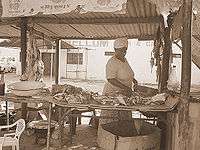Mbizo
Mbizo is a high density suburb in Kwekwe. It is located east of the city center across the railway line from ZIMASCO, the ferro-chrome producer. The suburb is divided into several sections all numbered one up to twenty. Mbizo Section One and Two form the oldest part of the suburb, which were originally built to house cheap labour for the gold mines in up town. Mbizo Stadium is located across from section one. Nearby, Manunure High School sprawls in a meadow across the street from Section Two.
Mbizo | |
|---|---|
Township, suburb | |
 Woman selling meat, one of the many trades in the town. | |
| Coordinates: 18°55′S 29°49′E | |
| Country | Zimbabwe |
| Province | Midlands |
| District | Kwekwe |
| Established | late 19th Century |
| Time zone | UTC+1 (CET) |
| • Summer (DST) | UTC+1 (CEST) |
Background
The suburb, as is everything in Zimbabwe's main towns and cities, was formally a black only area, reserved for the poor and African population that streamed to the town in search of jobs. Together with Amaveni, Mbizo supplied the much needed labour to the gold mines scattered across the growing town. Since independence, the population of the suburb has exploded and the suburb itself has expanded from two sections numbered one and two, to eighteen. Most of these sections have extensions called 'one extension' and so forth.
In the news
It is the home of Samukeliso Sithole, a man who competed in women's events under a pretense of being a woman.[1]
Politics
Like other townships in the working suburbs of cities across Zimbabwe, Mbizo has seen its share of political disturbances. Since 2000, when the Movement for Democratic Change (MDC) competed in elections, there has been sporadic political violence in many parts of the ward, from section 1 all to section 20. As in most acts of political violence, ZANU-PF militia units have been at the forefront of political violence in the township, and the police has stood by without arresting perpetrators of violence. Members of the MDC have been kidnapped, had their homes burnt and have been persecuted by the Zimbabwe Republic Police (ZRP) on many occasions. Reports of political violence in Mbizo have been reported in 2000, 2002, 2005, 2006, and 2008.[2]
Sports
Mbizo Stadium is a small stadium[3] and it is used for various activities, from hosting music concerts by popular artists like Alick Macheso, Simon Chimbetu to Tongai Moyo, a native of the town. The stadium is located in Mbizo section one, the oldest part of the township. It has a capacity of about a thousand people.
Stampede
On November 21, 2014, a stampede occurred at Mbizo Stadium in which killing 11 and injuring 40 people.[4] Reuters reported that around 30,000 people attended a religious service officiated by Walter Magaya.[5] After the service, the crowd left toward a single exit in a stampede, killing four immediately; seven others were pronounced dead at hospital.[5] The Business Standard reported that the stampede was caused by police firing teargas after some of the crowd attempted to break off parts of the stadium wall to exit.[4]
References
- "Male Zimbabwe athlete competed as a female". Archived from the original on 21 December 2007. Retrieved 19 January 2008.
- "Police Brutality condemned". Retrieved 19 January 2008.
- Dembare in Friendlies (accessed 02/11/2008)
- IANS (21 November 2014). "11 killed in Zimbabwe stadium stampede". Retrieved 6 January 2015.
- "Zimbabwe stadium church service stampede kills 11: police". Yahoo News. 21 November 2014. Retrieved 6 January 2015.